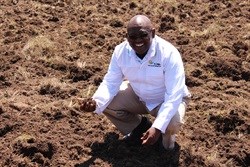
Top stories






More news


Marketing & Media
Ads are coming to AI. Does that really have to be such a bad thing?














ECRDA CEO Thozamile Gwanya says the R100m from the Eastern Cape Provincial Treasury is in addition to an amount of R91m committed last year over a three-year period by the Development Bank of Southern Africa's Jobs Fund to ECRDA and the Eastern Cape Development Corporation (ECDC) to roll out the agro-processing programme in Ncora and Mqanduli. Some 1866 hectares (ha) of white maize were planted in Ncora and Mqanduli in the first season of the DBSA Jobs Fund agro-processing initiative.
"A total of R53m and R46m respectively has been committed to Bizana and Lady Frere respectively over the next three years. In this first season, 1000 hectares of white maize will be planted in Bizana and another 100 hectares of sorghum will be planted in Lady Frere. A total of R20m has been committed for this first season of planting on both sites with the bulk, about R19,2m going toward mechanisation units and implements.
"We have now expanded the Mqanduli and Ncora RED Hubs from 1866a in the first season to 2000a this season. Some R16m have been spent in the two sites this season with individual landowners contributing 25% or R4m of the total," says Gwanya.
The initiative is managed along ECRDA's Rural Enterprise Development (RED) Hub concept which prioritises the village as the centre of operation. The concept links three market elements of production, processing and marketing to boost the competitiveness of rural economies and communities. The result is that production receives the market support it needs to flourish and money is kept alive and circulates within a community as long as possible.
These RED Hub market elements make up the value chain of the rural economy with coordination, integration and marketing being the core functions of the RED Hub. Ultimately, this concept creates a platform for economic activity resulting in increased rural incomes through the facilitation of primary production, promoting rural savings, investment, processing as well as the creation of a communal and external market.
"We are excited that this RED Hub agro-processing initiative is already taking shape. In practice, the RED Hub concept means that maize should be grown by the community, milled in the community, processed and packaged in the community and even sold back into the community with the whole process being owned by these communities," Gwanya says.
Gwanya says communities benefit by contributing their own land which has been lying fallow for many years for production.
"In the first year, government contributes 100% of the production costs and thereafter landowners through cooperatives contribute to production on a sliding scale.
"For example, in the second season, they will contribute 25% of costs, and 50%, 75% and 100% from the third to fifth year. This creates self-sustainability and a sense of ownership by communities in these programmes," Gwanya explains.